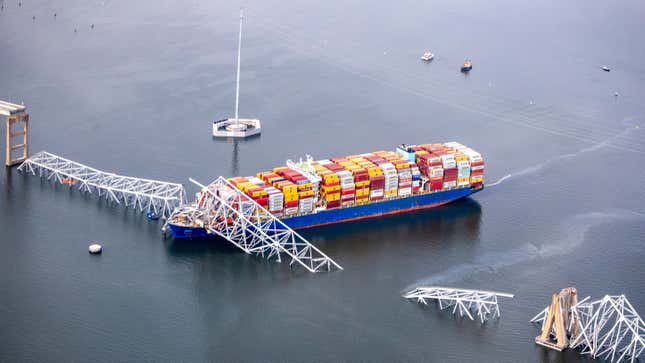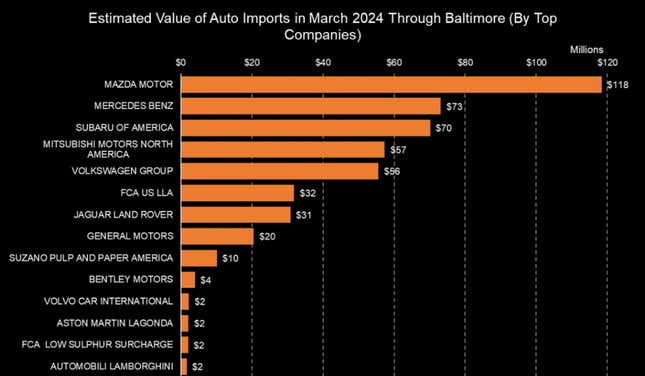
The collapse of the Francis Scott Key Bridge in the Baltimore Harbor is already posing a massive disruption to the automotive industry. The port handles imports, exports and parts shipments for major automakers like Audi, Bentley, BMW, Ford, General Motors, Jaguar-Land Rover, Lamborghini, Mazda, Mercedes-Benz, Mitsubishi, Nissan, Subaru, Stellantis, Toyota, Volkswagen and Volvo — all of which will more likely than not see major supply chain issues.
Baltimore Port’s private and public terminals handled 847,158 vehicles in 2023, according to Automotive News. Some automakers seem to be more impacted than others. Volkswagen said its operations were largely unaffected because of the location of its facilities. Meanwhile, Ford’s CFO told Bloomberg that the bridge collapse is “going to have an impact.”
“We do not anticipate any impact on vessel operations but there may be trucking delays as traffic will be rerouted in the area,” a spokesperson for Volkswagen told AutoNews.
BMW had a similar response to Bloomberg, saying it doesn’t expect the bridge collapse to have “any immediate impact on our business,” other than traffic issues.

Here’s how other, more strongly impacted automakers are dealing with the ramifications of the bridge collapse, from Bloomberg:
“It’s a large port with a lot of flow through it, so it’s going to have an impact,” John Lawler, Ford Motor Co.’s chief financial officer, said Tuesday on Bloomberg TV. “We’ll work on the workarounds. We’ll have to divert parts to other ports along the East Coast or elsewhere in the country.”
[...]
“We have experience now in understanding supply chain disruptions,” Lawler told Bloomberg TV. “So we’ll just put that experience to work and figure out the best solution.”
[...]
General Motors Co. also said it is working to reroute vehicle shipments that had come through the Port of Baltimore, which is now closed as authorities conduct a search and rescue for those who fell from the bridge. GM said in a statement that it expected “minimal impact” from the port closing.
Update: Tuesday, March 26, 2:20 p.m. EST: It is being reported on social media that the collapse will impact about 800 Jaguar-Land Rover vehicles. The automaker sent an internal bulletin to its dealers saying it is looking for a different port to offload its vehicles.
Update: Wednesday, March 27, 9:45 a.m. EST: A spokesperson for Stellantis gave this statement on the matter to the Detroit Free Press: “The Port of Baltimore is an important waterway for the automotive industry. We are initiating discussions with our various transportation providers on contingency plans to ensure an uninterrupted flow of vehicles to our customers and will continue to carefully monitor this situation.” The automaker ships Jeep Wranglers, which are built in Toledo, Ohio, out of the Port of Baltimore to Europe.
Earlier today we reported that the Francis Scott Key bridge was hit by a large cargo ship in the Port of Baltimore, which has been declared a “mass casualty event” by officials. The 948-foot-long cargo ship Dali was being piloted out of the bay when it lost propulsion. The ship put out a mayday call, but it was too late to get everyone off the bridge. Here’s more of our reporting:
The actual collision occurred around 1:30 a.m., and was caught on a livestream of the bridge. The span crumbles into the water about 20 seconds after the Dali, a Singapore-flagged cargo ship, made contact with one of the bridge’s central pylons. The 984-foot ship was only 30 minutes into a 27-day long journey to Sri Lanka when it hit the pylon. The livestream shows the ship lost all lights for a full two minutes before making contact with the bridge. A report from the Cybersecurity and Infrastructure Security Agency early Tuesday morning said the crew of the Dali warned officials the ship had lost all propulsion and a collision with the bridge was possible, according to ABC News.
This is a developing story, and Jalopnik will update it as more information becomes available.